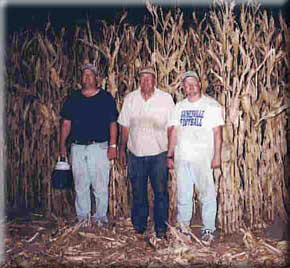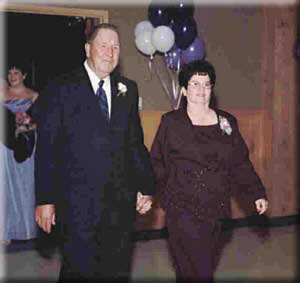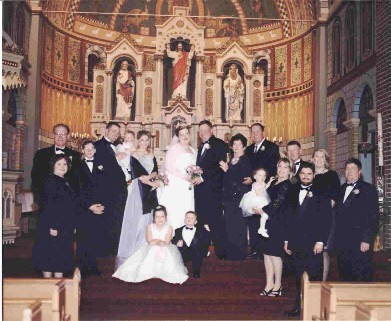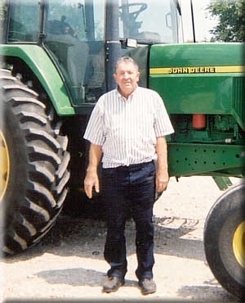Lifetime Farmer And Irish Fan Plants His Hopes On Alimta
Six feet two inches tall, husky at his "fighting" weight of 235 pounds, with the large, meaty hands and leathery skin of a life-long Texas farmer, 68-year-old Aloys Fuhrmann fills the doorway as he lumbers into the room. The son of a farmer, he has himself farmed for the last fifty years where he was born, in Gainesville, Texas. He speaks with a faint hint of a German accent, a dialect acquired from his forebears and the insular German-American farming community in which he was raised.
Aloys married Marge in 1962. Together they raised six children; all six live with their families within a five-mile radius of their parents' farm. Aloys and Marge instilled in their children principles of hard work and appreciation for a job well done. They led by example. Marge ran the household, herding the kids, keeping house and feeding some formidable appetites throughout the day. Aloys worked the farm up to 12 hours a day, always six days a week. His son Kevin works the farm with Aloys full-time. His two other sons work as public school teachers and also work the fields, which are filled with Fuhrmanns come harvest-time.
Farmers, teachers -- the Fuhrmanns fall within that class of unseen American working-class heroes who give so much more to society than they ask for or receive in return.
Aloys and Marge keep the Sabbath holy, leaving the week's hard labor behind for the Lord and family. After mass, Aloys and Marge are joined at their farm by their children and grandchildren for Sunday get-together. They pray gratefully over the farm-fresh food, their livelihood, a reminder our prayers should always include the farmers, ranchers and fishermen who feed us. After dinner, conversation often turns to the rich history of Notre Dame football; the Fuhrmanns are true fanatics. When Aloys is unable to pick up Irish away games on his house radio, he can be seen taking a lunch break on the hood of his pick-up, where the reception of the truck radio is better.
.1506051249009.jpg)
As a farmer, Aloys knows that all of his hard work can only affect but not control the outcome. He lives and dies with the weather, which can be particularly hard in Texas. Drought or deluge at the wrong time can kill a crop. Maybe it's years of pondering the hot sky which gouged the crow's feet at the corners of his eyes; maybe it's laugh lines from the weather's pernicious turns of cruelty and kindness. He embraces the weather, tries to understand it, and definitely respects it. He tries to prepare for the weather's vicissitudes.
He did not pay similar attention to his health, and there was no cause to. Aloys has always been a strong, healthy man who brushed aside ills that hinder other men. He does not smoke; never has. Nothing could have prepared him for the cataclysmic news which came out of the blue in August, 2003.
In May of this year, Aloys first began to notice that he was short of breath and unusually fatigued. When he could not complete a full day in the field, he began to think maybe something was wrong. In July, he attended his son Linus' wedding. During the reception, Aloys felt a tightness in his chest and decided to schedule an appointment with his family physician. The next week, Aloys met with his doctor, who thought Aloys might be suffering from the flu, or an inflammation in his throat. Aloys' complaints of chest pain persuaded his doctor to make a referral to a cardiologist.
The cardiologist took a sonogram of Aloys' throat and tested him for Lyme Disease and for the West Nile virus, but could not find anything wrong with Aloys. The cardiologist asked Aloys to return in two weeks for additional blood tests. Up to this point, Aloys had yet to have a chest film taken.

About one week later, Aloys awoke in the middle of the night with a sharp pain in his chest. He could not breathe. He was rushed south down Interstate 35 to Denton Regional Medical Center, where he was quickly admitted. A chest film was taken which revealed a right-sided pleural effusion. On August 7, Aloys underwent a thoracentesis. Nearly 2000 ccs of fluid were removed. A pathologist at the Anatomical Medical Laboratories in Denton examined the fluid and found no evidence of a malignant process.
On August 12, Aloys underwent a thoracoscopy. Several tissue samples were removed from the right middle lobe. A chest tube was also inserted. During the procedure, his surgeon left the operating room and told the Fuhrmann family that what he had observed in Aloys' chest was "something I have never seen before" and that the surgery was going to be longer than he anticipated. The procedure lasted almost three hours.
The specimens were again examined by pathologists at the hospital. The doctors initially considered a poorly differentiated squamous cell carcinoma; however, since the lesion was so close to the pleura, mesothelioma and poorly differentiated adenocarcinoma needed to be excluded using special staining.
The specimens were sent to ProPath Laboratory in Dallas, Texas for special immunohistochemical staining. The pathologists at ProPath diagnosed malignant epithelial mesothelioma.

Aloys was first informed by one doctor that the diagnosis was not cancer, but unfortunately, approximately fifteen minutes later, a second physician came into his room and frankly told Aloys and his family that he had a rare and incurable cancer. According to Aloys, "everyone told me it's just a real bad cancer, and it's not easy to treat at all". The Fuhrmann family was shocked and devastated. The next day, while still admitted, Aloys consulted with an oncologist who informed Aloys that surgery was not an option. Rather, Aloys' best chance was the current "gold standard" chemotherapy for mesothelioma, Alimta with Cisplatin.
Meanwhile, the Fuhrmann children went on the Internet to learn more about mesothelioma, treatment options and treaters. They discovered Dr. Roy Smythe at the M.D. Anderson Center in Houston and contacted his office. Dr. Smythe wanted to see Aloys immediately for evaluation and possible surgical intervention. After careful consideration, Aloys decided that even if Dr. Smythe felt surgery was in fact possible, he preferred to take Alimta.
On September 3, Aloys began treatment with Alimta in combination with Cisplatin at Denton Cancer Center. The initial treatment left Aloys nauseous and weak for days. He said "for ten days or so you just feel terrible, you can't hardly eat anything, your stomach is upset -- it's just real bad."
He receives one treatment every three weeks and has since completed his eighth treatment. A CT scan was taken in January that showed no tumor activity. Although still nauseous for days after a treatment, Aloys, his family and his doctors are pleased with the progress of the treatments
Since his diagnosis, Aloys has been unable to work in the fields. "It is one of my favorite things, working on the farm. I was planning to help on the farm like I had my whole life. I felt I could go another ten years or more without no trouble". He has hired several people to assist Kevin with the upcoming harvest. Normally, just Aloys and Kevin could handle the harvest. Aloys says he can no longer operate the combine because "it just wears me out." Aloys is terribly disappointed and depressed about not being able to work: "It is something I really, really love to do. It is just killing me to sit here when I know there is so much work to do. I'm trying to look to the future, but I don't know what to look for. You can't look, you just can't look with this thing in my chest."
He is also unable to spend time with his grandchildren. He used to play ball with them, take them fishing or just drive around the farm. It is a rite of passage for the grandkids to learn to operate the combine at a certain age with Aloys as their teacher. The kids are patiently waiting for their grandfather to get well so they can climb up next to him in the cab and participate in the harvest, as all Fuhrmanns do. We will keep you posted on the progress of this larger-than-life Texan.

*** POSTED FEBRUARY 16, 2004 ***
An Update -- 8/25/05
I am Aloys Fuhrmann's daughter, and we are so thankful for the information on the Roger Worthington website. I hope that by updating my father's profile, maybe some other patient or family will find some useful information.
On Sept. 3, 2003, my father began the Phase III clinical trial of Alimta/Cisplatin every 3 weeks. After a few treatments, the CAT scan revealed shrinkage of the tumor and my father's symptoms had tremendously improved. He experienced nausea and weakness for about a week after each treatment. He took 9 treatments of this combination then was changed to Alimta alone for 3 more treatments due to tingling in his feet and ringing in his ears caused by the Cisplatin. It was decided by his oncologist that it was time for a treatment break. This was in May of 2004.
My father was able to really enjoy the break. He worked hard on the farm everyday doing his usual physical labor. He always had a smile on his face and a positive attitude. In July 2004, he started to feel minimal shortness of breath and reported it to his doctor. It was time for a follow up CAT scan anyways which revealed growth of the mesothelioma tumor in the right lung and indicaton of a lymph node being affected by the disease. Although this was disappointing news, my father simply told the doctor to do what she could and he would do the best he could.
From July 2004 to September 2004, it was decided to give him a combination of Alimta/Gemcitabine. Again after some treatments, the CAT scan showed shrinkage. He continued on this treatment with stable disease. The treatments caused his blood counts to drop sometimes to dangerous levels. He took many Neupagen and Aranesp shots to offset the effects of the chemo. He couragously and positively continued until the oncologist felt she had maximized the combination and began another treatment break on September 27, 2004.
During this time, we had been looking into other clinical trials that he may be able to participate in. We became especially interested in an immunotoxin therapy for mesothelioma with Dr. Raffit Hassan at the NCI in Bethesda, Maryland. We liked the idea that the treatment had been fairly easily tolerated and it was a one time treatment with a minimal hospitalization. After much consideration, consultations, testing, and planning, my father traveled by plane, for the first time in his 69 year life, to the NCI in January 2005. On January 17, he began the treatment. He was hospitalized for one week. He experienced the expected side effects of shortness of breath, temperature, and retention of fluid. He was able to return home and after about a week, he started to feel like he was recuperating. We made plans for a follow up appointment at the NCI in one month.
On February 14 we made our return trip to the NCI. Dr. Hassan was so attentive and kind. All of the follow up tests looked good with the exception of the left lung showing fluid build up. My father was seen by the cardiologist to rule out any heart problems that could have caused the fluid. We left there with the recommendation that we make plans for a thoracentesis to drain the fluid when we return home. Four days later we were back in Texas and made arrangements for a CAT scan and thoracentesis. My father's shortness of breath had been worsening. The CAT scan revealed a pulmonary embolism in the right lung and increased fluid in the left lung. He had 1200cc's of fluid removed from the left lung and was admitted to the hospital for treatment of the pulmonary embolism. He started high doses of blood thinners. Days later, we heard the terrible news that the cytology report on the fluid from the left lung was positive for cancer. Although it was devastating to hear this news, my father bravely moved forward, simply asking the doctors to give him any treatment they think may help him.
In February 2005, he began Alimta alone. The doctors felt he was very weak and this may be tolerated better than anything else at this time. But after 2 treatments, the fluid returned and he underwent another thoracenteses draining 1200cc's of fluid again. The oncologist decided to add Carboplatin to the mix and after 2 more treatments the CAT scan showed improvement and shrinkage. He continued with this regimen until July 2005. In May, he again underwent thoracentesis of the left lung, but the doctor felt he still needed to complete this cycle of treatment before considering another treatment. His overall strength and stamina had declined although he would somehow will himself to continue to drive the tractor and harvest the soy beans. His work and family give him so much desire. He is truly amazing.
In the last 2 months he had been complaining of worsening shortness of breath and fatigue. The CAT scans had showed stable disease, but the doctors thought that maybe he had developed pneumonia because he had some fevers and a cough. His pain had also increased for which they prescribed a Fentanyl patch that was very helpful. Finally, on August 8 2005, the oncologist started him on oxygen therapy and again had him consult with his pulmonologist for possibly removing what seemed like fluid from his left lung again. Upon consultation 2 days later, the doctor decided to do a bronchoscopy that revealed no pneumonia or excess fluid. Instead he said it was his airways being squeezed by something, most likely the tumor on the pleural lining. We went home that day feeling very depressed and just decided we had to accept what was happening. Just 2 days later his condition had worsened to the point that we had to take him to the emergency room due to severe shortness of breath. The ER doctors determined he was very anemic and decided to give him 2 units of blood. After receiving one unit he did not improve, he actually worsened. The doctors started looking closer and discovered that he had a massive pericardial effusion. He had to have an emergency procedure to drain it. The doctor removed 1150cc's of blood from the pericardial sac. My father felt instant relief, but still faced a long road ahead. Because it was 3:00am on a Saturday night, my father did not get to see the thoracic surgeon until the next day and it was decided that on Monday he would have a heart surgery to perform a pericardial window to drain the fluid in the future if necessary. My father again bravely faced the procedure and made it through. We are not sure at this time why he had the bleeding around his heart, the cytology exam of the fluid is negative for cancer and we are still waiting for the biopsy report. They think the bleeding could have been caused from the high levels of Coumadin he had been taking for 6 months following the pulmonary embolism. He was discharged on the following Saturday August 20. Home health care began and like always, the nurses and therapists comment on my father's positive attitude and sincere kindness and humility.
He saw his oncologist 2 days ago, and was told that his chest x-ray looked great with no fluid accumulation in his heart or lungs. His blood counts had improved and his breathing was getting easier everyday. He plans on weaning himself off of the oxygen as he figures it will be hard to bring in the combine for the upcoming corn harvest. The oncologist plans on beginning chemo this week Friday. He will be taking Navelbine once per week indefinitely. Daddy says, "if they think it might help me, I'll take it." My mother is continually at his side giving him the best care possible. She even climbed in the tractor with him yesterday as they brush cut 30 acres together His six children, 11 grandchildren, 4 sisters, 3 brothers, and his entire extended family and community are all continually amazed at his desire for life and strength to endure all that he has. He has 2 more grandchildren on the way, one of them being mine due in October of this year, the other being my brother's due in February of next year. We feel so cheated by this horrible disease. We are thankful for the wonderful times we have so greatly appreciated and treasured for the past 2 years. Besides the tremendous medical worries and stresses, the financial burdens of attaining treatment, traveling, medicines, etc... have been astronomical. We thank the Roger Worthington Law Firm for all of their support.
Please let me know if you have questions concerning any of this information. His medical history is quite complicated. Thanks again and God bless!
Julie Martin
Mr. Alloys Fuhrman passed away on June 22, 2006

